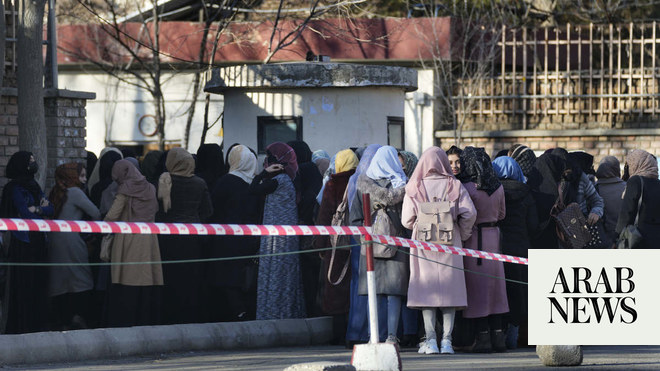
Ala Saleh says "Sudanese women have always participated in revolutions in this country"
Dubbed online as “Kandaka,” or Nubian queen, she has become a symbol of the protests
KHARTOUM: A Sudanese woman propelled to Internet fame earlier this week after leading protest chants in the capital told AFP Wednesday that woman are key to the uprising against President Omar Al-Bashir’s iron-fisted rule.
“Sudanese women have always participated in revolutions in this country,” Ala Saleh told AFP two days after video went viral of her standing on a car, conducting crowds outside the army headquarters in Khartoum.
“If you see Sudan’s history, all our queens have led the state. It’s part of our heritage.”
Demonstrators have been camped outside the military complex for days asking the army to back them in demands that Bashir step down.
“I’m very proud to take part in this revolution and I hope our revolution will achieve its goal,” Saleh said.
In the clips, she stands atop a car wearing an elegant, long white dress as she sings and works the crowd, her golden moon earings reflecting light from the sea of camera phones surrounding her.
Dubbed online as “Kandaka,” or Nubian queen, she has become a symbol of the protests which she says have traditionally had a female backbone in Sudan.
Woman have made up a large part of the demonstrators that since Saturday have thronged outside the sprawling army complex.
Braving regular volleys of tear gas, the crowds have been the biggest yet to rally against Al-Bashir’s rule since unrest broke out in late December.
“In such movements, women are widely participating not only for their rights but for the rights of the entire community... there’s no difference between women’s rights and community rights,” said Saleh.
“Women of Sudan always encourage their youths to fight. This is part of the history of Kandaka,” she added.
Saleh said she has taken part in the protests since they first erupted on Dec. 19 in response to a government decision to triple the price of bread.
The unrest quickly morphed into a nationwide campaign against Bashir’s rule with rallies held across cities, towns and villages.
The longtime leader has remained defiant and imposed a slew of tough measures including a state of emergency across the country.
Officials say 49 people have died in protest-related violence so far.












